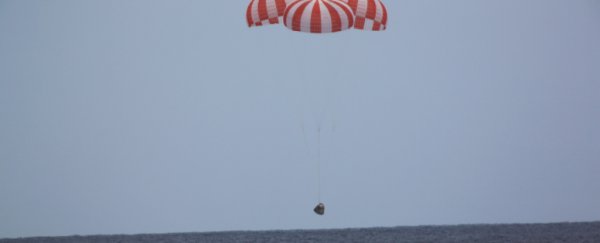After travelling more than 27 million miles around planet Earth, NASA astronauts Bob Behnken and Doug Hurley are headed home inside SpaceX's new Crew Dragon spaceship.
Despite the threat of Hurricane Isaias strafing coastal Florida with brutal weather, the two-man crew undocked their ship from the International Space Station Saturday evening, beginning the return of the first commercial astronaut mission, called Demo-2.
SpaceX made history in May when it became the first company in NASA's Commercial Crew Program to launch a spaceship carrying people to the International Space Station. In doing so, Elon Musk's rocket company also revived the United States' ability to launch its own astronauts into space, which hadn't been possible since the Space Shuttle program ended in 2011.
Two months later, Behnken and Hurley are attempting to return home in the same spaceship, which they have named Endeavour. Their journey includes a fiery return through Earth's atmosphere, which Musk has said is the part of the journey that concerns him the most.
Assuming all goes well, the Crew Dragon should splash down around 2:48 pm ET near Pensacola, Florida. If that site's weather is inclement, the astronauts will target a site 100 miles east near Panama City.
NASA TV is streaming continuous live coverage of the return flight below via the embedded YouTube player:
What to expect during the Crew Dragon's return
The astronauts successfully undocked from the ISS at 7:35 pm ET, kicking off the first major stage of their return voyage. They then performed a few major propellant burns, putting them on course for a landing in the Gulf of Mexico on Sunday morning.
Endeavour is expected to shed its trunk, which should burn up in the atmosphere. After the separation is complete, Crew Dragon should hurtle toward Earth at up to 17,500 miles per hour, or nearly 25 times the speed of sound.
During this fall, the spaceship's heat shield will have to protect the hardware and crew from temperatures of up to 3,500 degrees Fahrenheit. Musk has called this part of the journey his "biggest concern."
 Illustration of SpaceX's Crew Dragon returning to Earth with a blaze of plasma ahead of its heat shield. (SpaceX/YouTube)
Illustration of SpaceX's Crew Dragon returning to Earth with a blaze of plasma ahead of its heat shield. (SpaceX/YouTube)
After the Crew Dragon reenters the thicker parts of Earth's atmosphere, it should deploy two sets of parachutes. The first opens at 18,000 feet, then another set comes at 6,500 feet. After that comes splashdown: The capsule is expected to land some 22 to 175 nautical miles off of Florida's coast.
Barring any problems, NASA's continuous coverage will conclude Sunday with a news conference around 4:30 pm ET.
This article was originally published by Business Insider.
More from Business Insider:
